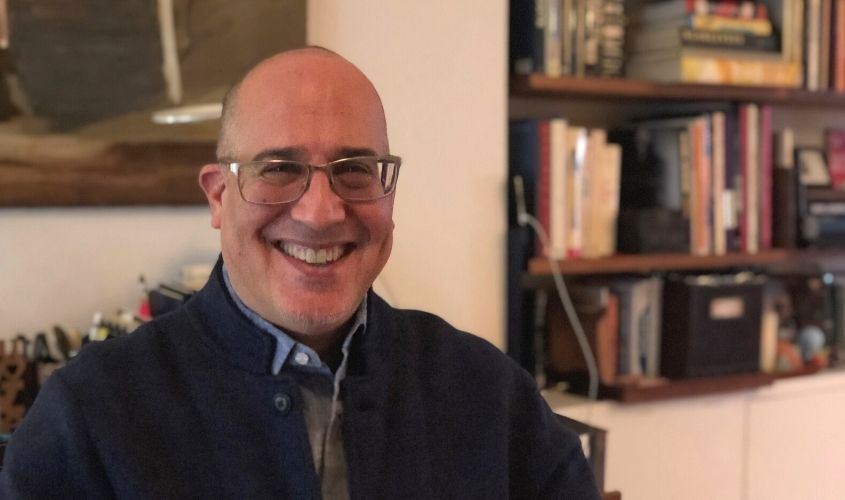
While navigating through medical school, managing one’s own health is too often a piece of the puzzle that students overlook. Doing so is a point of emphasis when Dr. Laurence Dopkin, St. George’s University’s assistant dean of students, meets with aspiring physicians.
Dr. Dopkin, a 1998 graduate of SGU himself, has been working with School of Medicine students for more than a decade, first as a professor of psychiatry and currently by providing academic and non-academic support and guidance to clinical students. Dr. Dopkin is also the acting director of behavioral health/associate director of child and adult psychiatry at the Morrisania Diagnostic and Treatment Center in New York City.
As part of the team within the Office of Dean of Students, “our assistance can come in many ways and is informed by each individual student’s particular needs, regardless of where they are in the academic continuum,” he said. “We are here to help triage student concerns, but we’re also here to help ensure that they are aware of and understand the rules and policies that they are expected to follow—rules and policies designed to help ensure they have a successful experience while at SGU. We are, and should be, their first point of contact for most concerns.”
Read more about Dr. Dopkin’s role, his advice for clinical students, and why psychiatry can be a fulfilling career choice for students.
St. George’s University: What challenges do some students face when they begin clinical rotations?
Dr. Dopkin: Transitioning from the on-campus setting to a new schedule and educational experience at the many and varied clinical training sites in the US and UK. This geographical transition is accompanied by a shift in students’ sense of community—with an interruption in who students interact with on a daily basis. While on campus in Grenada, students are the majority, whereas in the hospital setting, they are a smaller complement, working alongside other professionals that comprise the treatment team for each patient.
This is also time of many growing pains, which includes the translation and application of the knowledge gained in the basic sciences to the clinical realm. This can be challenging as students interact face-to-face with patients on a daily basis.
The acculturation to clinicals can be mediated by maintaining a connection to the on-campus community through the Student Government Association, taking advantage of the 60-plus student organizations supported by the Office of the Dean of Students, and via our SGU newsletters and social media.
SGU: How has the COVID-19 pandemic intensified those challenges?
Dr. Dopkin: From a behavioral health standpoint, medical school is challenging and stressful at baseline, and so these same stressors become exaggerated and magnified when you factor in an unprecedented health crisis.
Thankfully, we were able to quickly pivot and implement innovative online and web-based academic and non-academic clinical solutions for many of the obstacles the pandemic presented.
SGU: Why is it important for students to prioritize their mental health?
Dr. Dopkin: My best advice for students is simple—you need to take care of yourself, before you can take care of anybody else. Just like most diseases and disorders, early recognition, assessment, and diagnosis of a behavioral health issue can lead to simple, effective treatment and resolution of symptoms. The 24-hour availability of telehealth services for our students has improved the ease and speed of access to counseling.
SGU offers several free, confidential behavioral health services to all SOM students,
- The Psychological Services Center in Grenada offers telehealth and in-person counseling for individuals, groups, and families.
- The BCS Group is a newer counseling service for our medical and veterinary students that provides 24-hour telehealth counseling for individuals and couples across all time zones, as well as psychiatry referrals for US-based clinical students.
SGU: What are the most satisfying qualities of a career in psychiatry?
Dr. Dopkin: I found psychiatry to be an unsolved puzzle compared to the other fields in medicine, and the biopsychosocial model, along with the history of the field, were what initially drew me to psychiatry.
Some of the most fulfilling aspects of being a psychiatrist are the diverse opportunities available based on your individual interests. I have worked in hospital-based psychiatric emergency rooms, free-standing outpatient clinics, inpatient and outpatient consultation services, and courts. I’ve taught medical students in most of those settings and trained psychiatric residents in others. I’ve worked in administrative, educational, and clinical roles, and in private practice consultation. I’ve treated children as young as four and on upwards from there.
Psychiatry truly allowed me to develop an expertise while allowing me to continue to enjoy and “practice” so many other areas of medicine that were of interest to me.
Dr. Dopkin can be reached by email at ldopkin@sgu.edu.
— Laurie Chartorynsky